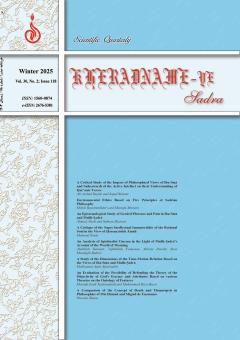A Comparison of the Concept of Death and Thanatopsis in Philosophies of Mīr Dāmād and Miguel de Unamuno
Subject Areas : Studies on Mulla Sadra and the Transcendent Philosophy
1 - Assistant Professor, Department of Teaching Educational Sciences, Farhangian University, Tehran, Iran
Keywords: Philosophy, gnosis, Death, thanatopsis, Miguel de Unamuno, Mīr Dāmād,
Abstract :
Thanatopsis has always been discussed alongside thinking about existence in different fields of philosophy. In other words, death is one of the oldest philosophical and gnostic problems that has been discussed by several philosophers and thinkers, each approaching it based on their own philosophical principles. This study has examined and compared the concept of death and thanatopsis in the philosophies of two prominent thinkers, Miguel de Unamuno and Mīr Dāmād. Evidently, each of them has a particular view in this regard based on his own specific philosophical system and school of thought. This analytic-comparative study has been carried out relying on library and research resources. Here, the author tries to respond to the question of what the meaning of death and thanatopsis in the philosophies of these two philosophers is. The findings indicate that, given the concepts of death and life, piety plays a central role in the philosophical and gnostic thoughts of both thinkers, and death is a metaphysical and ontological problem in their philosophies. Apparently, both of them believe that fear of death is an intrinsic problem that bothers all living things; nevertheless, this fear is moderated by man’s awareness of being and nature’s method of work. Accordingly, instead of viewing death as a purely destructive phenomenon, both of them consider it to be an affirmative affair.
قرآن کریم.
اونامونو، مایگل (1383) درد جاودانگی، ترجمۀ بهاءالدین خرمشاهی، تهران: ناهید.
بلاکهام، هـ.ج. (1393) شش متفکر اگزیستانسیالیست، ترجمة محسن حکیمی، تهران: نشر مرکز.
تافه، تامس (1379) فلسفه آرتور شوپنهاور، ترجمة عبدالعلی دستغیب، آبادان: پرسش.
داودی کهکی، ریحانه؛ ذهبی، سیدعباس (1396) «مرگ و جاودانگی در اندیشه میرداماد»، انسانپژوهی دینی، شمارۀ 37، ص24ـ5: 10.22034/ra.2017.27530
شوپنهاور، آرتور (1388) جهان همچون اراده و تصور، ترجمة اي جی پین و رضا ولییاري، تهران: نشر مرکز.
صادقی، مرضیه (1387) «تحليل وجودشناختی رابطه خدا و جهان از ديدگاه ميرداماد»، انديشه ديني، شمارۀ 29، ص41ـ5.
کارترایت، دیوید آي. (1392) واژهنامه تاریخی فلسفه شوپنهاور، ترجمۀ محسن اکبري، تهران: نشر معاصر.
مطهری، مرتضی (1399) عدل الهی، تهران: صدرا.
معین، محمد (1378) فرهنگ فارسی، تهران: امیرکبیر.
مگی، برایان (1378) مردان اندیشه، ترجمۀ عزتالله فولادوند، تهران: طرح نو.
ملاصدرا (1386) مفاتیح الغیب، تصحیح و تحقیق نجفقلی حبیبی، تهران: بنیاد حکمت اسلامی صدرا.
ميرداماد، محمدباقر (1367) القبسات، بکوشش مهدي محقق، تهران: دانشگاه تهران.
ميرداماد، محمدباقر (1380) الجذوات والمواقيت، بکوشش علي اوجبي، تهران: ميراث مکتوب.
ميرداماد، محمدباقر (1381) مصنّفات ميرداماد؛ الصراط المستقيم، سدرة المنتهی،الايماضات، التقديسات، تقويم الایمان، بکوشش عبدالله نوراني، تهران: انجمن آثار و مفاخر فرهنگي.
ميرداماد، محمدباقر (1385) تقویم الایمان و شرح کشف الحقایق، گردآورنده ملاعلی نوری، بکوشش علی اوجبی، تهران: میراث مکتوب.
هایدگر، مارتین (1389) هستی و زمان، ترجمۀ سیاوش جمادی، تهران: ققنوس.


